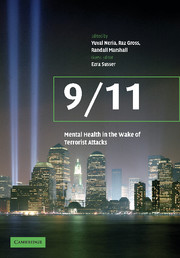Book contents
- Frontmatter
- Contents
- Acknowledgments
- Editors brief bio
- List of contributors
- Foreword
- Part I Introduction
- Part II The psychological aftermath of 9/11
- 2 Preface
- 3 Post-traumatic stress symptoms in the general population after a disaster: implications for public health
- 4 Coping with a national trauma: a nationwide longitudinal study of responses to the terrorist attacks of September 11
- 5 An epidemiological response to disaster: the post-9/11 psychological needs assessment of New York City public school students
- 6 Historical perspective and future directions in research on psychiatric consequences of terrorism and other disasters
- 7 Capturing the impact of large-scale events through epidemiological research
- 8 Mental health research in the aftermath of disasters: using the right methods to ask the right questions
- Part III Reducing the burden: community response and community recovery
- Part IV Outreach and intervention in the wake of terrorist attacks
- Part IV A New York area
- Part IV B Washington, DC
- Part IV C Prolonged-exposure treatment as a core resource for clinicians in the community: dissemination of trauma knowledge post-disaster
- Part V Disasters and mental health: perspectives on response and preparedness
- Index
7 - Capturing the impact of large-scale events through epidemiological research
from Part II - The psychological aftermath of 9/11
Published online by Cambridge University Press: 27 October 2009
- Frontmatter
- Contents
- Acknowledgments
- Editors brief bio
- List of contributors
- Foreword
- Part I Introduction
- Part II The psychological aftermath of 9/11
- 2 Preface
- 3 Post-traumatic stress symptoms in the general population after a disaster: implications for public health
- 4 Coping with a national trauma: a nationwide longitudinal study of responses to the terrorist attacks of September 11
- 5 An epidemiological response to disaster: the post-9/11 psychological needs assessment of New York City public school students
- 6 Historical perspective and future directions in research on psychiatric consequences of terrorism and other disasters
- 7 Capturing the impact of large-scale events through epidemiological research
- 8 Mental health research in the aftermath of disasters: using the right methods to ask the right questions
- Part III Reducing the burden: community response and community recovery
- Part IV Outreach and intervention in the wake of terrorist attacks
- Part IV A New York area
- Part IV B Washington, DC
- Part IV C Prolonged-exposure treatment as a core resource for clinicians in the community: dissemination of trauma knowledge post-disaster
- Part V Disasters and mental health: perspectives on response and preparedness
- Index
Summary
Introduction
Since the United States Civil War in the 19th century and World War I in the early 20th century, it has been recognized that some of the casualties of war are caused by the psychological impact of these experiences rather than just by their physical impact. Similarly, since the seminal descriptions of survivors of the Coconut Grove fire disaster in 1942 (Adler, 1943), many studies of natural and human-made disasters, including toxic exposures, have described their physical and psychological consequences (Havenaar et al., 2002). By their very nature, the recent terrorist attacks are specifically intended to induce fear (terror) in the population in addition to physical casualties and damage. Hence it is useful to consider the lessons learned from research on the diverse catastrophic experiences over the past 50 years.
The advent of structured interviews and clinical criteria in psychiatric research during the 1970s spurred a large number of epidemiological studies that have quantified the impact of disasters on mental health and well-being (Bromet & Dew, 1995; Galea et al., 2005; Van den Berg et al., 2005). The first study to use structured diagnostic interviews focused on the impact of the 1979 accident at the Three Mile Island nuclear power plant rates on major depression and generalized anxiety disorder (Bromet & Schulberg, 1986). Since then, the Diagnostic and Statistical Manual of Mental Disorders (DSM) classification system officially operationalized post-traumatic stress disorder (PTSD), and the ICD-10 introduced a similar category. Subsequently, much of the research on the psychological impact of disasters has tended to focus more or less exclusively on PTSD, even though it is increasingly recognized that the range of potential negative outcomes is far broader and includes affective, anxiety, and substance use disorders and non-specific medical symptoms.
- Type
- Chapter
- Information
- 9/11: Mental Health in the Wake of Terrorist Attacks , pp. 114 - 127Publisher: Cambridge University PressPrint publication year: 2006



